 Agnieszka Holland is one of Poland’s pre-eminent directors and one of the few women directors working today in Hollywood. Her career started under the tutelage of such master filmmakers as Krzysztof Zanussi and Andrzej Wajda, but soon she started making her own award-winning films. In the United States Holland’s first gained recognition with “Angry Harvest,” an Oscar-nominated World War II drama about a Polish farmer who shelters a Jewish refugee. Agnieszka Holland is a versatile director, drawn to a variety of themes, eager to explore difficult moral ambiguities of human lives and changing identities. Her most acclaimed film, “Europa, Europa,” tells a harrowing story of a Jewish boy drafted into Hitler’s army. “Oliver, Olivier” is a haunting tale of a disappeared child who returns to his family an entirely different person. “The Secret Garden” revisits a beloved children’s classic based on Francis Hodgson Burnett novel. “Total Eclipse” delves into the troubled and notorious relationship between two French poets, Paul Verlaine and Arthur Rimbaud. “Washington Square,” the adaptation of Henry James’ novel, chronicles a woman’s search of her true self. This list of Holland’s feature films is far from complete, and it doesn’t even begin to deal with numeorus TV dramas and films, made in America and Poland, all tribute to Holland’s versatility and cinematic brilliance.
Agnieszka Holland is one of Poland’s pre-eminent directors and one of the few women directors working today in Hollywood. Her career started under the tutelage of such master filmmakers as Krzysztof Zanussi and Andrzej Wajda, but soon she started making her own award-winning films. In the United States Holland’s first gained recognition with “Angry Harvest,” an Oscar-nominated World War II drama about a Polish farmer who shelters a Jewish refugee. Agnieszka Holland is a versatile director, drawn to a variety of themes, eager to explore difficult moral ambiguities of human lives and changing identities. Her most acclaimed film, “Europa, Europa,” tells a harrowing story of a Jewish boy drafted into Hitler’s army. “Oliver, Olivier” is a haunting tale of a disappeared child who returns to his family an entirely different person. “The Secret Garden” revisits a beloved children’s classic based on Francis Hodgson Burnett novel. “Total Eclipse” delves into the troubled and notorious relationship between two French poets, Paul Verlaine and Arthur Rimbaud. “Washington Square,” the adaptation of Henry James’ novel, chronicles a woman’s search of her true self. This list of Holland’s feature films is far from complete, and it doesn’t even begin to deal with numeorus TV dramas and films, made in America and Poland, all tribute to Holland’s versatility and cinematic brilliance.
Agnieszka Holland’s latest film “In Darkness” — Poland’s official pick for the Academy Awards’ foreign language film category — has already been hailed her best since “Europa Europa,” (Screen Daily). Los Angeles Times praised it for its “brutal honesty” and TIFF Program describes it as “a self-portrait of mankind, magisterial and Shakespearean in its grasp of what we are capable of doing to — and for — each other.”
Granted half an hour with Agnieszka Holland whose work I have admired for decades, I congratulate her on her achievements and begin by asking her about her latest film:
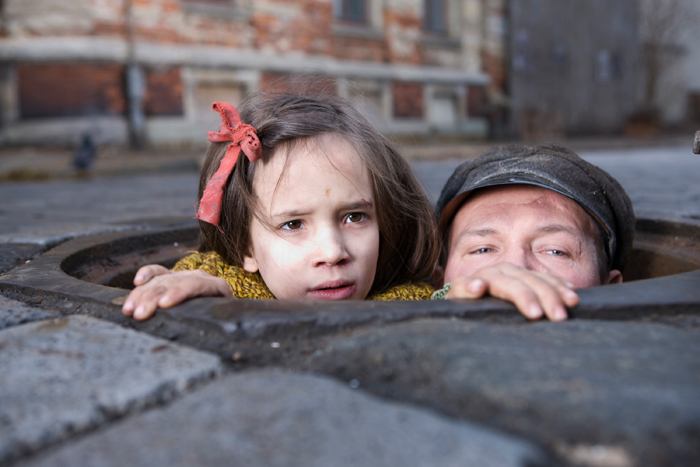 ES: “In Darkness” is an extraordinarily moving story of a simple man faced with a complex moral problem, a choice whether to aid a group of Jewish refugees from the Lvov ghetto, a choice that might potentially cost him his life and destroy his family. The script was written by a Canadian, David Shamoon. It was based on a British book by Robert Marshall, “In the Sewers of Lvov.” How did you come upon the story?
ES: “In Darkness” is an extraordinarily moving story of a simple man faced with a complex moral problem, a choice whether to aid a group of Jewish refugees from the Lvov ghetto, a choice that might potentially cost him his life and destroy his family. The script was written by a Canadian, David Shamoon. It was based on a British book by Robert Marshall, “In the Sewers of Lvov.” How did you come upon the story?
AH: The producer, with whom I have worked before, sent me the script. Then came an official offer which I passed at first, then accepted, then passed again before I finally accepted. It was a “long waltz.”
My main problem with acceptance was that when I read the script I wanted to make this movie only if it had wider authenticity. It was crucial to me to assure the truthfulness of the descriptions and the world of the people it was depicting. So I told the producer that such truthfulness could only be achieved in the original language of the story. And that the film had to be done, at least partially, in Poland, with the participation of Polish actors.
The producers wanted to film “In Darkness” in English, for financial reasons. It is cheaper and easier to do a film in English only, even if it doesn’t make sense. So it was a long process to convince the producers to do the film mostly in Polish. And then it was a long process to find enough money to shoot it in Poland. Some Canadian financial backing disappeared when the filming location changed, but in the end it all came together just as I wanted it, and I accepted.
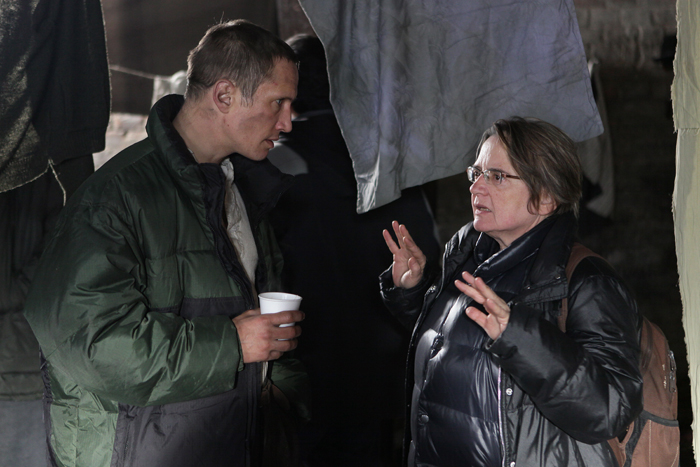 ES: What attracted you to this particular story? Why was it important to tell?
ES: What attracted you to this particular story? Why was it important to tell?
AH: The story itself attracted me. Many Holocaust survivor stories are extremely powerful in terms of their dramatic impact—they have some kind of mythical dimension—but in this one there were three elements which were speaking to me. These elements I considered original and attractive for a filmmaker. First, I was attracted to the main character, Leopold Socha, the arc of his transformation, his development. I must say that the script was well written in this respect. The character was complex already in the first draft, I found, and after the script has been revised this complexity went even further. Leopold Socha turned out to be very surprising: a primitive character faced with the enormity of what was happening to him. The struggles that were happening in his soul were, I think, fascinating.
Second, I liked the way the other characters, the Jewish characters, were portrayed in the story. I liked that they were not angelic victims, like the Jewish survivors often are portrayed in Hollywood Holocaust films, but that they were people with weaknesses who are very human, very multidimensional.
Finally, I also liked that 80% of the film happened in the sewers and was, therefore, filmed in darkness. Ever since Wajda’s “Kanał” there was not a movie like that. For me, it was both scary and challenging. And exciting at the same time. The very thought that it was possible to tell the story in this way was thrilling.
ES: “In Darkness” is dedicated to Marek Edelman and I saw many echoes of his powerful book “And there was love, too, in the ghetto….” in the film. If you were to add more to this dedication, what would you say?
AH: Marek was important for me, very close, a friend. We have been friends in spite of the difference of generations. He always very much wanted me and Andrzej Wajda to make a film about love in the ghetto. We promised him to participate in such a movie if it ever became available.
Marek Edelman always spoke in a very bold way on how it was to be in the ghetto, and in the Ghetto Uprising. He talked about people’s behaviour. He never made it sentimental, but described people the way they were. He spoke about the heroes of the Warsaw Ghetto Uprising, like Mordechai Anielewicz, as human beings, complete with their weaknesses. He was very honest in his descriptions.
It was Marek Edelman who always stressed that people were making love in the bunkers, under the worst conditions and circumstances.
Love was important in the ghetto, he told us. Sex was important. Closeness. Much more important than at other times. Love in the ghetto was much more intense and necessary than it is under ordinary circumstances, and I wanted to be true to Marek’s admonition. By the way, the love scenes were in the script from the very beginning. Maybe not to such an extent at first, but they were there, so the scriptwriter’s intuitions were in the right place.
Through this film I wanted to thank Marek for all the truth he told me about this period.
ES: The following question comes from my own interests and challenges as a writer who tells Polish stories to Western audiences. You have done it in film many times. When you tell these stories what —if anything — changes in the telling?
AH: I agree, it is a challenge. How to do it without making a story simplistic? The reason I managed to make some kind of a career in the United States was that my goal was to be always accessible. I have also chosen a similar approach in Poland. “Fever,” my film about a little known incident from a revolutionary period in the Polish history, is a good example. It told this 1905 story of a bomb which was to destroy the enemy but which actually brought death and misery to the plotters to a Polish audience who did not know much of this incident. Especially the way it was told in the film, from a particular point of view . . . I am always trying to tell a complex or a complicated story in ways that are simple. This is something that is natural to me. I don’t try to analyze. I try to speak from a human point of view, even if some details are hard to understand for some people. I believe that even if certain specific details are not widely known, the audience can overcome such lapses in knowledge. The core of the story, its emotional part, however, is absolutely essential. This is what the audience has to connect with. When I started making “In Darkness” at first I wanted to add more complexity to the way the situation in Lvov is presented in the film. I wanted to expand the historical context of the interactions between Jews, Poles, Ukrainians, and Germans at that time. For a while I even wanted to use excerpts from historical German reels, which are absolutely incredible, but somehow the movie did not like it. I realized that if I did include these excerpts, the film would become heavy handed. A bit like a docudrama type of a movie. That, I didn’t want. Now we have so many sources available. We have the internet. Viewers can go there and check the facts they have missed. Find the context of the story.
ES: And does anything change in you in these re-tellings?
AH: In me?
I always use myself as a medium to tell the story. Every new reality which I enter changes something in me. Stories I tell become part of me. Always.
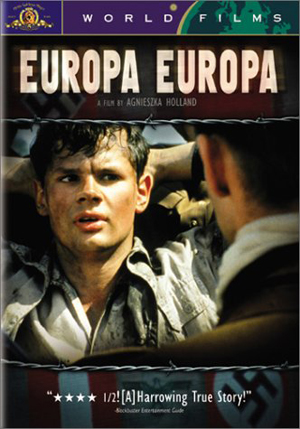 ES: “In Darkness” is your first film on the Holocaust theme since “Europa, Europa,” a film which New York Times critic writes “accomplishes what every film about the Holocaust seeks to achieve: It brings new immediacy to the outrage by locating specific, wrenching details that transcend cliche.” It was nominated for the Academy Award’s Best Adapted Screenplay, and won the Golden Globe for Best Foreign Film.
ES: “In Darkness” is your first film on the Holocaust theme since “Europa, Europa,” a film which New York Times critic writes “accomplishes what every film about the Holocaust seeks to achieve: It brings new immediacy to the outrage by locating specific, wrenching details that transcend cliche.” It was nominated for the Academy Award’s Best Adapted Screenplay, and won the Golden Globe for Best Foreign Film.
Was “Europa, Europa” a turning point for you?
AH: “Europa, Europa” was certainly the most important film for me, for my career, as it opened many possibilities to do international movies and to work in America, in the United States. It was also a film many people really liked. It was a good movie for the younger generation too. It spoke to them. The film not only gained a lot of applause, but also had a really broad response. It won numerous awards and received an Oscar nomination for Best Adapted Screenplay. Personally I have to confess that it is not my favourite movie. Lightness and humour made it acceptable for many people. It was ironic, and that appealed to many others. The story was good, the subject matter very important to me and yet I have other favourites.
ES: Which ones?
AH: I like what I call my “chamber movies,” smaller movies that tell a quieter, more subdued story, like “Angry Harvest,” with all its flaws. Or like “Olivier, Olivier.”
But now, I really like “In Darkness.”
ES: I’d like to ask you about the music in your films. You’ve worked with different composers, Jan Kaczmarek, Zbigniew Preisner, to name the most important ones. The music for “In Darkness” was written by Antoni Komasa-Łazarkiewicz. What changes when composers change?
AH: With Kaczmarek I had a very good bond. He lived in Los Angeles at the time when I was working on my films there. We had some personal connections. When I met him I was struggling with “Angry Harvest,” for which Jörg Straßburger wrote the music. Kaczmarek listened to my frustrations and then he mentioned that he would like to write something for one of my films. I always liked his music, but thought that it was not for me and I told him that at the time. But then, he made a spec music for my film and I loved it. I loved working with him. Our sensitivities match. He wrote the music for “A Girl Like Me: The Gwen Araujo Story”, “Total Eclipse,” and for “Washington Square.”
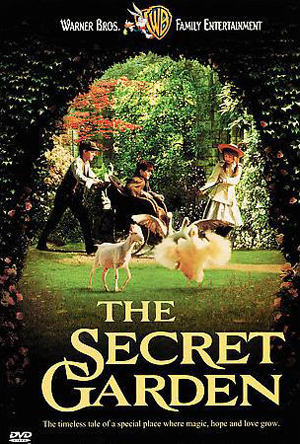 With Zbyszek Preisner my cooperation took a different turn. Preisner wrote music for “Europa Europa,” and then wonderful, haunting music for “Olivier Olivier.” But with “The Secret Garden” we began having difficulties. Preisner had problems dealing with pressure from the studio and unfortunately, had a rather childish way of reacting to problems. He couldn’t understand the circumstances and restrictions we had to work under. We split.
With Zbyszek Preisner my cooperation took a different turn. Preisner wrote music for “Europa Europa,” and then wonderful, haunting music for “Olivier Olivier.” But with “The Secret Garden” we began having difficulties. Preisner had problems dealing with pressure from the studio and unfortunately, had a rather childish way of reacting to problems. He couldn’t understand the circumstances and restrictions we had to work under. We split.
Antoni Komasa-Łazarkiewicz is an extremely talented young composer and my nephew. Antek started composing at a very early age. For “The Secret Garden” he composed the interlude of child-like music when he was 13. It was to accompany the fragment in which the film children try to make music work as a charm, to make the father to come back. Preisner who wrote the music for the whole film was struggling with this piece for quite some time. He tried to do it, but it didn’t work. Whatever he produced sounded phony. Too adult, as if an adult painter tried to paint like a child.
Antek happened to be in London at the time, on my invitation. “Let me do it,“ he said. We were in the house of my friends. There was a piano there. My daughter Kasia Adamik was there too with her friend Karolina Ochab, who now is the director of the National Theatre in Warsaw and they said, “O.K. But we are going to be Antek’s agents.” So they prepared a contract with Zbyszek Preisner who signed it and Antek disappeared in the room where the piano stood. After 15, 20 minutes he came out with a wonderful piece of music, exactly what was required for this particular scene. I immediately shared it with the children actors and they loved it, too. So this short piece turned out to be Antek’s first appearance in the movie music world. Zbyszek Preisner, I must stress, kept his end of the bargain, he credited Antek with this piece.
Antek Komasa-Łazarkiewicz wrote the music for “In Darkness,” and for “Julie walking home,” very interesting, very powerful music. He also wrote the score for “Janosik,” “Copying Beethoven” and for “Ekipa,” the Polish TV drama. He is a very versatile composer. I like working with him because he is very open, very original.
ES: And since time is running out, my last question: open-ended, about your Polish-Jewish identity. How do you place yourself within this kind of spectrum?
AH: This is a complicated question. I am half Polish and half Jewish. I feel for both halves. My Jewish side gives me sensitivity to the Jewish destiny. I am always concerned with it. But I am also always concerned with my Polish side. To sum it up I’m bothered both by Polish anti-Semites and by Jewish anti-Polish attitudes.
Double identity, if you use it right, opens you to the richness of two cultures, two backgrounds. In a way I can be more objective when I speak from either of these sides of me, experience human empathy with my two sides, even if they find themselves in conflict.
But a double identity also carries problems with it. Sometimes it feels more like a curse. I’m always an outsider. Since only my father was Jewish, for Orthodox Jews I am not Jewish at all. For Polish anti-Semites I am too Jewish. What counts for me is the awareness of the best and the worst parts of both sides. In the end, however, no matter how much it may disturb or hurt, for me, my double identity, the double aspect of my life is important. I feel quite complete with it.
ES: Thank you very much.
Imagery
- Agnieszka Holland photographed by Eva Stachniak at the Toronto International Film Festival. Sept 13, 2011, Intercontinental Hotel, Toronto
- Krystyna (Milla Bankowicz) and Leopold Socha (Robert Wieckiewicz). Photo by Jasmin Marla Dichant, Courtesy of Sony Pictures Classics
- Agnieszka Holland Directing Benno Furman. Photo By Robert Palka/Fotos-Art
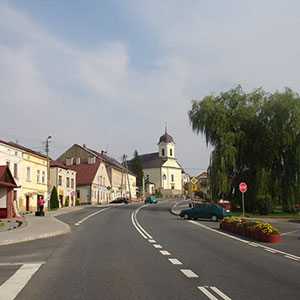
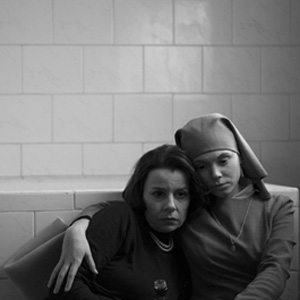
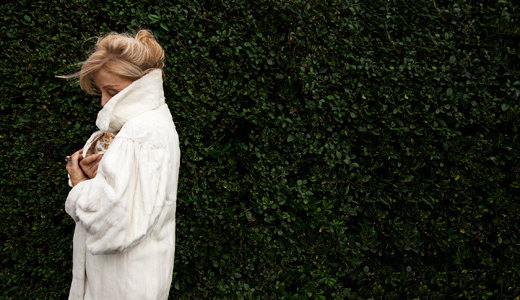

Pingback: Bulletin Board Fall 2014